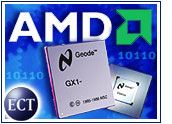
Seeking to target the embedded applications market, chipmaker Advanced Micro Devices has announced the acquisition of National Semiconductor’s Information Appliance (IA) unit and the Geode family of microprocessors.
AMD said the deal, terms of which were not disclosed, will make it the only company with the resources to deliver a standard architecture from desktop and server platforms to embedded and mobile applications. However, IDC vice president of semiconductors Mario Morales told TechNewsWorld that the Geode acquisition means AMD now has two architectures competing for space in the embedded market, which includes set-top boxes, Internet appliances and handheld computers.
There is some speculation about the purpose of AMD’s acquisition, which seems to put the company in the position of being forced to choose which architecture to support and promote — the newly-acquired Geode x86 framework or the earlier-acquired Alchemy MIPS architecture.
“[The embedded market is] an area in which they’re trying to position themselves with Alchemy,” Morales said. “It’s a little interesting they would complement it with this [acquisition of Geode].”
Architecture Commitment
AMD said it will acquire intellectual property and assets consisting primarily of the Geode family of microprocessor products from National Semiconductor through the deal. The companies said about 132 employees from National’s Information Appliance unit will join AMD’s Personal Connectivity Solutions (PCS) group.
AMD vice president of marketing Phil Pompa told TechNewsWorld that the Geode acquisition expands AMD’s commitment to the x86 architecture, which the Sunnyvale, California-based company now can extend into new low-power applications.
“There’s an existing product family and set of customers we’re serving by taking this and making it into a new AMD distribution channel,” Pompa said. “Most of these are existing customers that will now get a more complete set of products to choose from.”
Alchemy Action
Still, just as AMD announced its Geode acquisition, the company also unveiled its design for the Alchemy Au1100 processor — based on the competing MIPS architecture — that will power new Linux handheld devices.
AMD, which acquired Alchemy last year, said the Au1100, combined with a software development suite from Metrowerks, represents a new alternative for the PDA market. AMD’s Pompa said the company will aim its Alchemy processors at the low-power end of the embedded market, while the x86 architecture will serve where there is a need for more power.
“One easy way of segmenting is power,” Pompa said. “That’s the real basic point of differentiation.”
Choice Brings Challenge
IDC’s Morales questioned whether AMD will be able to devote the necessary resources to support both architectures amidst the company’s financial struggles.
“It will be difficult to position this in their portfolio, but also to have the resources it needs,” he said. “They’re acquiring a company that needs a lot of resources.”
Morales, who said it appears AMD will not reach profitability until next year, added that the bulk of the chipmaker’s resources are needed for its core competency: the Athlon processor and upcoming Hammer-based solutions.
Intellectual Property Value
Although he questioned AMD’s ability to devote the necessary resources to support both the MIPS architecture and the Geode x86 architecture, Morales did indicate that the company might find value in the intellectual property obtained from National Semiconductor.
“[Intellectual property] might be something AMD is able to leverage,” he said, referring to National Semiconductor’s extensive design activity.
He noted that National Semiconductor went after the appliance and embedded market with Geode, which was one of the first x86 family of processors to target low-power devices, but failed to deliver any equipment to mass production.
Bargain Foils Focus
With the recent spinoff of its Flash processor division, it looked like AMD was focused on its core business, but the Geode acquisition makes that strategy somewhat unclear, according to Morales.
“All of a sudden they make this acquisition that is not as synergized,” he said.
He added that the deal with National Semiconductor, which announced its intention to sell the unprofitable Geode unit earlier this year, was passed over by other chipmakers, including Taiwanese player VIA.
“National probably almost gave it away,” he noted.
Pick Your Processor
Not all analysts agreed the acquisition fragments AMD’s focus, however. IDC senior analyst Shane Rau told TechNewsWorld that the deal allows AMD to make up for lost ground on the x86 architecture, which the company has largely ignored for a few years.
“Like its purchase of Alchemy Semiconductor helped AMD accelerate its entry in embedded processors based on the MIPS architectue, AMD’s purchase of National’s Information Appliances business unit will accentuate its re-entry into embedded processors based on the x86 architecture,” Rau said.
He added that AMD seems to be seeking access to National Semiconductor’s customers and the ability to serve them with a choice of MIPS-based or x86-based solutions.





















































